Grammar1
牛津译林版英语九上Unit 4《Growing Up》(Grammar1)教学设计

牛津译林版英语九上Unit 4《Growing Up》(Grammar1)教学设计一. 教材分析牛津译林版英语九上Unit 4《Growing Up》主要讨论成长过程中的变化和经历。
本单元的Grammar 1部分主要引导学生理解并运用现在完成时态,通过照片和故事来描述自己成长过程中的变化和经历。
教材内容丰富,插图生动,有利于激发学生的学习兴趣和参与度。
二. 学情分析九年级的学生已经掌握了基本的英语语法知识,具备一定的听说读写能力。
他们对成长过程有自己的理解和体验,因此对于本节课的主题会感到熟悉和兴趣。
但部分学生对于现在完成时态的运用还不够熟练,需要老师在教学中给予指导和练习。
三. 教学目标1.让学生掌握现在完成时态的构成和用法。
2.培养学生用现在完成时态描述自己的成长经历和变化。
3.提高学生的听说读写能力,增强他们的英语综合运用能力。
四. 教学重难点1.现在完成时态的构成和用法。
2.如何运用现在完成时态描述自己的成长经历和变化。
五. 教学方法采用任务型教学法,让学生在实践中学习并掌握现在完成时态。
同时运用情境教学法,创设生动有趣的情境,让学生在真实的环境中运用英语。
六. 教学准备1.准备与成长过程相关的图片和故事。
2.设计相关的练习题和活动。
3.准备教学PPT。
七. 教学过程1.导入(5分钟)利用一张婴儿照片,引导学生谈论成长过程中的变化。
例如:“Look at this baby photo, can you guess who it is? Now let’s talk about the changes you’ve experienced since you wer e a baby.”2.呈现(10分钟)通过展示一张学生的成长照片,引出现在完成时态的概念和用法。
例如:“Look at this photo of XXX, we can see that XXX has grown a lot. Now let’s talk about XXX’s changes using the present perfect tense.”3.操练(10分钟)学生两人一组,互相描述对方的成长经历和变化。
九年级英语 Unit5 Grammar1课件 牛津版
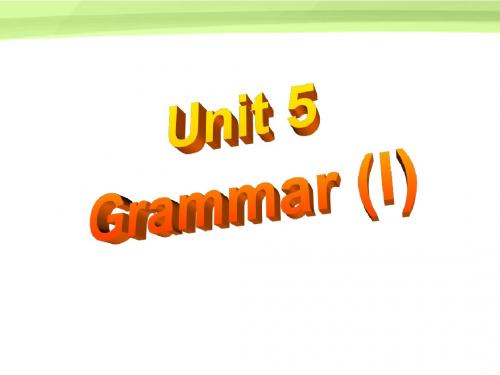
We use the past perfect tense to talk about an action that happened before another action in the past. The earlier action is expressed in the past perfect tense and the later action is expressed in the simple past tense.
1.过去完成时常与 before 等词构成的短语连用。如: 过去完成时常与by, 等词构成的短语连用。 过去完成时常与 1) 到上学期末为止我们已学了三千多个英语单词了。 到上学期末为止我们已学了三千多个英语单词了。
We had learned over 3,000 English words by the end of last term.
4.过去完成时可用在宾语从句中或通过上下文表示。如: 4.过去完成时可用在宾语从句中或通过上下文表示。 过去完成时可用在宾语从句中或通过上下文表示
1)他说他已买了一辆新自行车。 1)他说他已买了一辆新自行车。 他说他已买了一辆新自行车 He said he had bought a new bike. 2) 我同桌告诉我她去过北京两次了。 我同桌告诉我她去过北京两次了。 My partener told me she had been to Beijing trwice.
1)做完作业后,他上床睡觉了。 做完作业后,他上床睡觉了。 做完作业后 After he had finished his homework, he went to bed. 2)当他关了灯后 就锁上门回家了。 当他关了灯后, 当他关了灯后 就锁上门回家了。 When he had turned off the light, he locked the door and went home.
高中英语外研版必修3习题3-3Grammar(1)

Module 3第 3课时Ⅰ .拼写1. The storm r________ the crops seriously.2. The thief set f________ to the house and escaped.3. Make some sentences a________ to the example.4. He was going over his p________ papers to prepare for the exam.5. My father w________ us that the road was crowded.6. ________(火山灰 )and lava poured down the mountain.7. The________()of the volcano was terrifying.8. Luckily, there's still some________( 可能性 )for him to recover.9. Parents spend an________(均匀 )of $ 220 a year on toys for their children.10. Be careful and don't________( 落下 )your keys behind.7.eruption答案: 1.ruined 2.fire 3.according 4.previous 5.warned 6.Ash8.possibility 9.average 10.leaveⅡ .填空从中所的 A 、 B、 C、 D 四个中出一个最正确答案。
1. If you have questions, ________the guide book.A . look atB . look forC.refer to D .look into答案: Clook into“ ”。
牛津译林版英语九上Unit4《GrowingUp》(Grammar1)说课稿
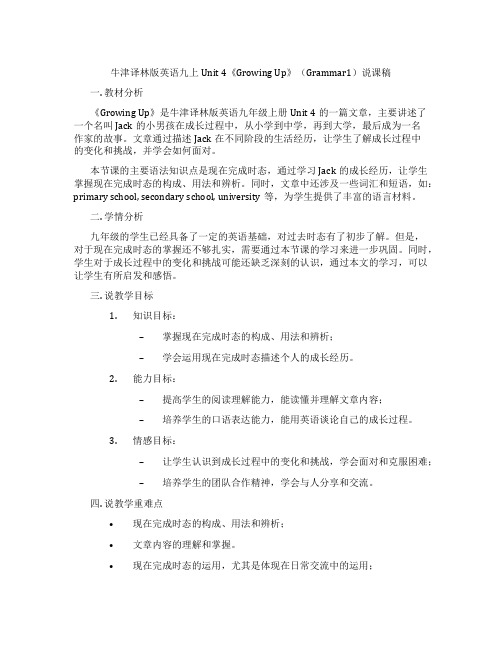
牛津译林版英语九上Unit 4《Growing Up》(Grammar1)说课稿一. 教材分析《Growing Up》是牛津译林版英语九年级上册Unit 4的一篇文章,主要讲述了一个名叫Jack的小男孩在成长过程中,从小学到中学,再到大学,最后成为一名作家的故事。
文章通过描述Jack在不同阶段的生活经历,让学生了解成长过程中的变化和挑战,并学会如何面对。
本节课的主要语法知识点是现在完成时态,通过学习Jack的成长经历,让学生掌握现在完成时态的构成、用法和辨析。
同时,文章中还涉及一些词汇和短语,如:primary school, secondary school, university等,为学生提供了丰富的语言材料。
二. 学情分析九年级的学生已经具备了一定的英语基础,对过去时态有了初步了解。
但是,对于现在完成时态的掌握还不够扎实,需要通过本节课的学习来进一步巩固。
同时,学生对于成长过程中的变化和挑战可能还缺乏深刻的认识,通过本文的学习,可以让学生有所启发和感悟。
三. 说教学目标1.知识目标:–掌握现在完成时态的构成、用法和辨析;–学会运用现在完成时态描述个人的成长经历。
2.能力目标:–提高学生的阅读理解能力,能读懂并理解文章内容;–培养学生的口语表达能力,能用英语谈论自己的成长过程。
3.情感目标:–让学生认识到成长过程中的变化和挑战,学会面对和克服困难;–培养学生的团队合作精神,学会与人分享和交流。
四. 说教学重难点•现在完成时态的构成、用法和辨析;•文章内容的理解和掌握。
•现在完成时态的运用,尤其是体现在日常交流中的运用;•对文章深层含义的理解,以及如何将文章内容与个人经历相结合。
五. 说教学方法与手段1.采用任务型教学法,让学生在完成任务的过程中,自然地学习和掌握现在完成时态;2.运用情境教学法,创设各种情境,让学生在实际情境中运用英语;3.利用多媒体教学手段,如图片、视频等,激发学生的学习兴趣,提高课堂效果。
牛津译林版英语九上grammar1
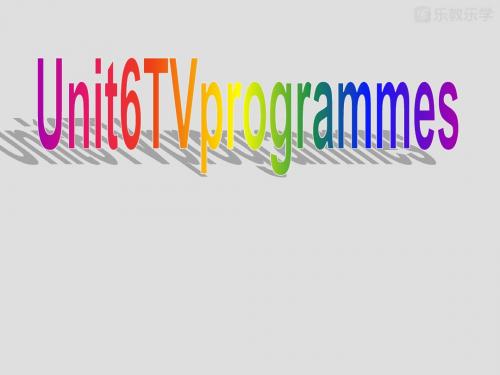
If-clause (simplepresenttense)
Ifyouareafootballfan,
Ifyouareananimallover,
If-clause (simplepresenttense)
Mainclause (will/may/might/…+in finitive)
Ifyouenjoysolvingmyst youmightlikethisfilm. eries,
attackcatchhuntliveprotectwalk
Dad:Whatwilltigersdoiftheyhavebabies? Millie:Tigers(9)___________asafamilyif willlive they(10)____________. havebabies Dad:Whatwillmalewolvesdoifthere’s danger? adj.雄性的 Millie:Malewolves(11)____________their willprotect familiesifthere(12)___________. isdanger
单项选择。 1.If there ________ no buying and selling of animals, there _______ no killing in nature. A. A is; will be B. will be; will be C. is; is D. will be; is
1 Unlesstheweatherreportsaysitis
goingtorain,______c 2Wewillarriveatthestudioaround9:30a. m.,_______ d
牛津译林版八年级英语上Unit1 Grammar1课件

不规则变法
little far old
Complete the table .
adjective funny
good happy
comparative
funnier
superlative
funniest best happiest
better
happier
interesting
large
more interesting most interesting larger smarter redder largest smartest reddest
worst worse bad 最差的 更差的 Which flower is ______, worse this one or that one ? That flower is ________ the ,更糟的 worse adj. 最差的,最糟的 worst n. 高,高度 height /ai/ n. 重量 weight /ei/ n. 秒(=second) Sec. competition n. 竞赛,比赛,竞争 v./n. 测试,考查 test n. 游泳者 swimmer
1. We use comparatives + than to compare two people or things. e.g. Tom is cleverer than Daniel. This film is more interesting than that one.
We add -er / -est after short adjectives. We use more/ most before long adjectives.
zxxk
How tall the woman is!
GRAMMAR-1 语态
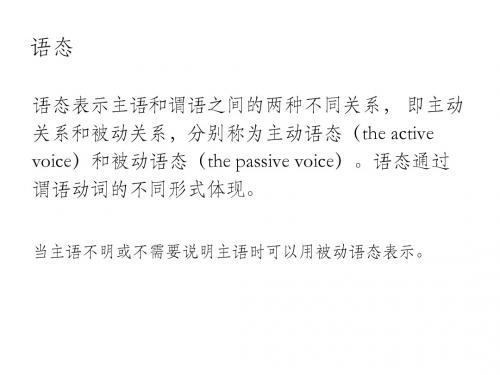
1. 不必说明动作的执行者 How is this word pronounced? 2. 强调动作的承受者 If you break the school rules, you will be punished.
3. 动作的执行者不是人而是无生命的事物 They were shocked by the news of his death.
4. 有些动词习惯用被动语态 He was born in this city. The school is situated in the suburbs. 5. 使句子更加简练、匀称 The old professor gave a lecture on American history and was well recieved.
语态
语态表示主语和谓语之间的两种不同关系, 即主动 关系和被动关系,分别称为主动语态(the active voice)和被动语态(the passive voice)。语态通过 谓语动词的不同形式体现。
当主语不明或不需要说明主语时可以用被动语态表示。
被动语态的常见形式 一般现在时中的被动结构:am/is/are done 一般过去时中的被动结构:was/were done 一般将来时中的被动结构:will/shall be done 现在进行时中的被动结构:am/is/are being done 过去进行时中的被动结构:was/were being done 将来进行时中的被动结构:will/shall be being done 现在完成时中的被动结构:have/has been done 过去完成时中的被动结构:had been done 将来完成时中的被动结构:will/shall have been done
Grammar1一般将来时态

翻译成英语: 他们将帮助老人打扫他们的公寓.
They will help the old people clean their flats . They will help the old people to clean their flats .
I will find _______(find) someone to fix my broken Bicycle tomorrow .
判断下列时态标志词:
1.sometimes,often 2.look,listen,now 3.soon,next week 一般将来时 一般现在时 现在进行时
用所给词的适当形式填空:
____she be ____(be) a singer tomorrow ? Will
用所给词的适当形式填空:
和一般将来时连用的时间,举例说明:
tomorrow,next week,next month ,next year, in five minutes (五分钟后)等将来的时间 。
变成一般疑问句并做出肯定和否定回答:
She will fly a kite next Friday .
Will she fly a kite next Friday ? Yes, she will . No, she will not ./No ,she won't
You`ll go to the zoo tomorrow . I`ll go to the zoo tomorrow.
He/She will fly to the U.K. next week .
结论(一般将来时的陈述句): 主语 + will+动原 +其他 。 Will可以和各种人称或名词连用。
Grammar1 比较级与最高级

fast
nice large big hot easy early tired
faster
nicer larger bigger hotter easier earlier more tired
fastest
nicest largest biggest hottest easiest earliest most tired
⑦在含有or的选择疑问句中,如果有 两者供选择,前面的形容词要用比较 级形式。 Which/Who is + 比较级, A or B ? • 谁更高,Tim还是Tom? • ___ is ____ ,Tim or Tom?
• 数学和英语哪个简单? • ___ is ___ , maths or English?
Grammar
形容词和副词的比较级与最高级形式
big
big
◇Look at the pictures and understand
看图并理解
big
biggest
bigger
fast
fastest fast faster
大多数形容词和副词有三个等级:
1、原级,即原形。 (没有比较时用原级) 2、比较级,表示“较……”或“更……一些” 。
一班的学生比二班多。
④ … is the +比较级 + of the two.
• 汤姆是这两个男孩中最高的 。 • Tom is _______ of the two boys. • 在两个女孩中Amy矮。 • Amy is__ ___ of the two girls.
⑤ “比较级 + and + 比较级”或 “more and more +原级”表示“越 来越……”
Grammar(1)优秀版

洁心与大熊在进入高中的第一天相识,两人都是大个子,分座位的时候,老师让男女生各排一队,一队一个次第走到座位上,最后一排有六张桌子,洁心谦虚地站到一个比自己矮一点 点的女生前面,与大熊成了同桌
2. I saw John yesterday. I _h_a_d_n_’_t_s_e_en__ (not see) him before I left Beijing.
3. When I got to the cinema, the film h_a_d__b_e_e_n_(be) on for twenty minutes.
The past perfect tense
When we talk about an action happened before action in the past. For example Audrey had put all her effort into ballet training before she entered the film industry.
4. You never told me you _h_a_d__se_e_n_ (see) the film before.
5. The tickets h_a_d__b_e_e_n__so_l_d_ (sell) out by the time we got to the theater.
6. The train _h_a_d_ already _le_f_t (leave) when we arrived at the station.
高中英语牛津译林版必修三UNIT1GRAMMAR课件-
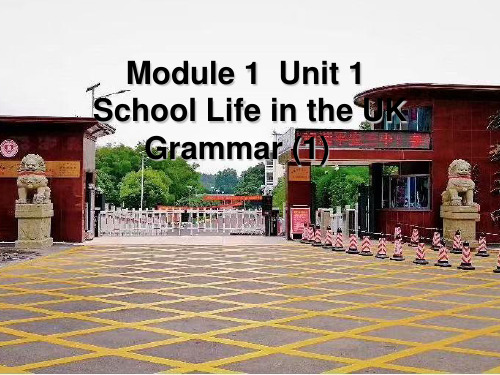
things
Conclusion
which/that people/thing subject/object
Conclusion
Relative pronouns used in attributive clauses
第三关 Pratice
一. 用关系代词填空
1.The girl __w_h_o_/_th_a_t__is standing next to our teacher is her daughter.
7. I used to study in a classroom ___w__h_o_s_e____windows were all broken.
试着找出下列句中的先行词,引导词和定语从句
1. The trees which are on the school campus have lost their leaves. 2. The students whom we saw just now are the best runners in our school. 3. She has a brother whose name I can’t remember. 4. The school where he studied is in Shenzhen.
In attributive clauses ,the antecedent is
as Attribute, we use whose to refer to
________.
people/t
hing
Conclusion
whose people/thing attribute
Paul is an American _w_h_o__s_efull name is Paul William Walker IV. He was affected by his mothewr_h_o__/t_h_a_t__ was a model. Later he became an actor
7A Unit5 Grammar1教学案

7A Unit5 Going shopping教学案第四课时 Grammar 1课型:新授执笔:鲁河中学陈寿红审核:初一年级英语组【学习目标】1.学会在疑问句和陈述句中使用there be结构2.学会使用there be 向别人介绍新事物【课前预习】一、请用动词Be的适当形式填空。
1. There _____ two English books on the desk.2. _____ there an American girl in your class?3. There _____ a football and some toys on the bed.4. There ______ (not) any water in the river.5. There ______ 100 dollars in the purse (钱包).6. _____ there many cakes and an apple in the box?二、选择填空。
( )1. Are there _______ in your class?A. any boyB. any boysC. any boiesD. some boys( )2. Wu Dong and his sister _______ a new bike.A. haveB. there areC. hasD. there is( ) 3. There is _______ cat here.A. not anB. noC. no anyD. not any( ) 4. ---- What’s on the table?----_______ some books on it.A. There’sB. There’reC. It’sD. They’re【课堂解疑】1、当我们想向别人介绍某地方有……的时候,我们可以用There be句型来介绍新事物,现在让我们来具体地学习这个句型,然后你们就可以运用自如了!There be句型There is/ are + 某物/某人+某地,表示“某地有某人或某物”,句中is/ are与最靠近他们的名词在数方面必须一致。
8A Unit 5 Grammar1教案
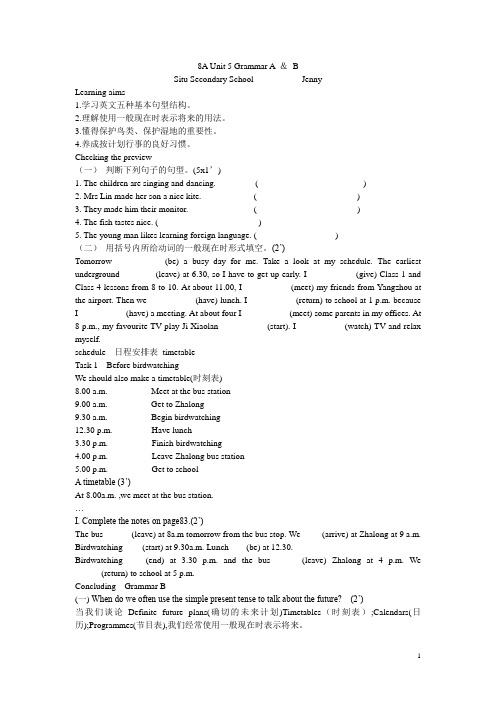
8A Unit 5 Grammar A& BSitu Secondary School JennyLearning aims1.学习英文五种基本句型结构。
2.理解使用一般现在时表示将来的用法。
3.懂得保护鸟类、保护湿地的重要性。
4.养成按计划行事的良好习惯。
Checking the preview(一)判断下列句子的句型。
(5x1’)1. The children are singing and dancing. ( )2. Mrs Lin made her son a nice kite. ( )3. They made him their monitor. ( )4. The fish tastes nice. ( )5. The young man likes learning foreign language. ( )(二)用括号内所给动词的一般现在时形式填空。
(2’)Tomorrow __________ (be) a busy day for me. Take a look at my schedule. The earliest underground _______ (leave) at 6.30, so I have to get up early. I __________ (give) Class 1 and Class 4 lessons from 8 to 10. At about 11.00, I __________ (meet) my friends from Y angzhou at the airport. Then we __________ (have) lunch. I __________ (return) to school at 1 p.m. becauseI __________ (have) a meeting. At about four I __________ (meet) some parents in my offices. At8 p.m., my favourite TV play Ji Xiaolan __________ (start). I __________ (watch) TV and relax myself.schedule 日程安排表timetableTask 1---Before birdwatchingWe should also make a timetable(时刻表)8.00 a.m. Meet at the bus station9.00 a.m. Get to Zhalong9.30 a.m. Begin birdwatching12.30 p.m. Have lunch3.30 p.m. Finish birdwatching4.00 p.m. Leave Zhalong bus station5.00 p.m. Get to schoolA timetable (3’)At 8.00a.m. ,we meet at the bus station.…I. Complete the notes on page83.(2’)The bus ______(leave) at 8a.m tomorrow from the bus stop. We_____(arrive) at Zhalong at 9 a.m. Birdwatching ____(start) at 9.30a.m. Lunch ___ (be) at 12.30.Birdwatching ____(end) at 3.30 p.m. and the bus ______(leave) Zhalong at 4 p.m. We ______(return) to school at 5 p.m.Concluding---Grammar B(一) When do we often use the simple present tense to talk about the future? (2’)当我们谈论Definite future plans(确切的未来计划)Timetables(时刻表);Calendars(日历);Programmes(节目表),我们经常使用一般现在时表示将来。
Grammar1
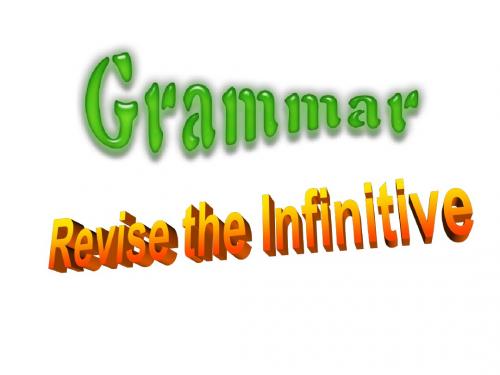
句型:think / consider / find /…+ it + adj. + to do
常见动词不定式作宾语的动词有:
agree, afford, appear, ask, attempt, care, choose, claim, dare, decide, demand, deserve, determine, expect, fail, get, hate, hesitate, hope, hurry, intend, learn, manage, offer, plan, prepare, pretend, promise, refuse, seem, tend, threaten, want, wish + to do
4. I don’t have time to sit around feeling sorry for myself. attribute 5. I am the only student in my class to take part in the competition. attribute 6. A big company has decided to buy it from me. object 7. My fellow students have begun to accept me for who I am. object
式做后置定语。
4. 如果不定式是不及物动词, 则后面需加
适当的介词。
Please pass me some paper to write ___. on
He is a good boy to get along well with
Grammar1(1)

what, which, who, whom, whose, where, when, why, how除在句子中起连接作用外,还可 在从句中充当一定的成分,且各有各的词义.
• Exercises: • 1. I don’t know _____ we can live on the island without any food. • A. where B. what C. how D. that • 2. Could you tell me ______? • A. where is the park? B. who is on duty? • C. whose book is this? • D. what are they doing? • 3. The teacher told us that the earth____ around the sun. • A. moved B. moves C. move D. moving
Grammar
1.They know the teacher.
They know that the teacher is a man.
2.I agree with you. I agree with what you said. 3.The problem is money. The problem is that we have no money.
5.His eyes stare at what is left of the brothers dinner on the table. 6.May I ask how much money you have? 7.That is why we have given you the letter.
结论: 作宾语(表语)的句子就叫宾语(表语) 从句.
- 1、下载文档前请自行甄别文档内容的完整性,平台不提供额外的编辑、内容补充、找答案等附加服务。
- 2、"仅部分预览"的文档,不可在线预览部分如存在完整性等问题,可反馈申请退款(可完整预览的文档不适用该条件!)。
- 3、如文档侵犯您的权益,请联系客服反馈,我们会尽快为您处理(人工客服工作时间:9:00-18:30)。
Music Born in America语法学案命制:魏淑慧审核:牟慧芳班组:姓名:组评:师评:学习目标:☆知识目标:巩固时间状语从句并归纳各种时间的表达法;☆能力目标:认识省略现象.☆情感目标:温故知新,学以致用。
(一)Adverbial clauses of time (时间状语从句)一.常见引导词;when, while, as(当…时); as soon as, the moment, directly, immediately(一…就); until, till(直到); before(在..之前); after(在…之后); since, ever since(自…以来); once(一旦); whenever(任何时候); every time, each time(每次).二.解析:⑴when 的用法①When 引导的时间状语从句的谓语动词可以是延续性的,也可以是非延续性的,既可以是从句动作与主句动作同时发生,也可表示从句的动作先与主句动作发生。
When he reached home, it was getting dark. (主从句动作同时发生)I shall tell her the good news when she comes. (从句动作先于主句动作发生)②当when 引导的从句谓语动词是延续性的,when 类似于while.When (while) he was crossing the road, he was knocked down by a passing car.③when 还可以做并列连词,表一个动作即将或正在进行的时候,突然发生了另外一件事。
其意义为“那时”“这时”,相当于at this\ that timeWe were having a meeting when someone broke into.We were about to go out, when it suddenly began to rain.④when 还可表原因“既然”It was foolish of you to take a bus when you could easily walk there in five minutes.⑵while的用法①while 引导的从句谓语动词为延续性的,表示“与……同时”“在……其间”从句常用进行时态,强调某一时间内主句和从句的动作同时发生。
Someone knocked at the door, when (while) I was watching TV.Strike while the iron is hot.②while 有时可以表示前后两种情况进行对比,作为并列连词“而,却”He likes pop music, while I am fond of folk music.③While 放在句首引导从句,译为“尽管”While I think you idea is good, I don’t quite agree with everything.⑶as的用法as 表示“当……时候”或“一边……一边”,as 的从句中可使用延续性动词,也可使用非延续性动词。
He sang as he was working.As time goes by, we have a better understanding of things around us.As I get older, I get more optimistic. (4) till, until 引导的时间状语从句①till 引导的时间状语从句主句的动词常是延续性的。
而not…until 引导的时间状语从句主句的动词常是短暂性的We will stay here till\until it stops raining.John did not announce the news till he was sure of it.②Not until 置于句首时,主句的主语和谓语要倒装,表示加强语气。
Not until Mary had heard that sound was she really frightened.(5) as soon as, immediately, directly, once, the instantly, instant ly, no sooner……. than, hardly \scarcely……when 引导的时间状语从句,表示“一……就……”I came immediately I got your message.Once you lose confidence, you won’t be able to do the work well.Jack had hardly\scarcely seen me when he left the classroom.※当no sooner, hardly, scarcely 置于句首时,主句要部分倒装.Hardly\scarcely had we gathered in the wheat when it began to rain.No sooner had we arrived at the station than the train left.(6) before 和since①若表达“还未……就…; 不到……就,……才……,趁,还没来得急”时,需用连词before.We had sailed four days and four nights before we saw land .我们航行了四天四夜才看到了陆地。
We hadn’t run a mile before he felt tired.我们跑了还不到一英里他就累了。
Please write it down before you forget it.趁你现在还没忘,请把记下来。
Before I could get in a word he had measured me .我还没来得及插话,他就给我量了尺寸。
②before 在从句中谓语动词不用否定式。
Before they reached the station, the train had gone.他们(还没)到火车站以前,火车就开走了。
③.It will be + 一段时间+ before… 多久之后才。
It will be half a year before I come back.④在“It is + 一段时间+ since 从句”句型中,时间的计算一律从动作完成或状态结束时开始。
从句动词是短暂性动词按原意思翻译,延续性动词按相反的意思翻译。
It is three years since the war broke out.战争爆发以来三年了。
It is three years since he lived here.他离开这里三年了。
(二)Ellipses (省略)1. 简单句中的省略1)省略主语祈使句中的主语通常被省略。
如:(You) Open the door, please. 请开一下门。
其他省略主语多限于现成的说法。
如:(I) Thank you for your help 谢谢你的帮助。
(It) Doesn’t matter. 没关系。
2)省略主谓语或主谓语的一部分如:(There is) No smoking. 禁止抽烟。
(Is there) Anything else? 还有其他事吗?(You come)This way please. 请这边走。
(Will you) Have a smoke? 抽烟吗?3)省略宾语。
如:—Do you know Mr. Li?你认识李先生吗?—I don’t know (him. )我不认识他。
4)省略表语。
如:—Are you thirsty ? 你渴了吗?—Yes, I am (thirsty). 是的,我是。
5)同时省略几个成分。
如:—Are you feeling better now? 你觉得好些了吗?—(I am feeling ) Much better (now). 好多了。
(I wish) Good luck (to you). 祝你好运/祝你顺利。
2. 并列复合句中的省略在并列句中后边的分句可以省略与前边分句中相同的成分。
如:John came in April but Bob (came) in May.约翰四月份来的但鲍伯五月份来的。
The boy picked up a coin in the road and (the boy) handed it to a policeman.这小男孩在马路上捡到了一枚硬币并交给了警察叔叔。
Your advice made me happy but (your advice made) Tom angry.你的建议让我感到高兴但让汤姆生气。
3. 主从复合句中的省略1)状语从句中的省略一般说来省略现象多出现在下列五种状语从句中:由when, while, as, before, after, till, until, once等引导的时间状语从句;由whether, if, unless 等引导的条件状语从句;由though, although, even if, whatever等引导的让步状语从句;由as, than 等引导的比较状语从句;由as, as if, as though 等引导的方式状语从句。
上述状语从句在省略时应遵循下列规则:当状语从句的主语与主句的主语一致时,可以省略状语从句的主语和系动词be,这时从句中可出现如下结构:(1)连词(as, as if, once)+名词; (2)连词(though, whether, when)+形容词;(3)连词(whether, as if, while )+介词短语;(4) 连词(when, while, though )+现在分词;(5)连词(when, if, even if, unless, once, until, than, as )+过去分词;(6)连词(as if, as though )+不定式。
如:Once (he was) a worker, Pang Long now becomes a famous singer.庞龙曾经是一名工人,现在成了一名有名的歌手。
Work hard when (you are) young, or you’ll regret.趁你年轻时努力工作,不然你以后会后悔。
He looked everywhere as if (he was) in search of something.他四处张望好像在找什么。
